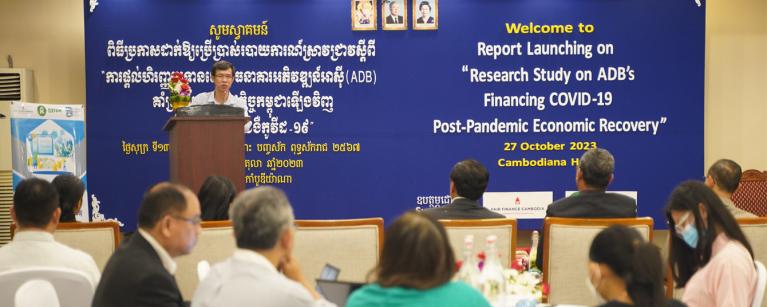Fair Finance Cambodia (FFC) released a study on October 27, 2023, that examined the Asian Development Bank’s (ADB) financing of post-COVID-19 economic recovery. The study specifically focused on the impact of the ADB-funded infrastructure project known as Road #23/312 in Cambodia. Its goal was to identify policy gaps in Cambodia’s green and sustainable economies and assess any disparities between policies and practices within institutions.
The study presented seven key recommendations for the ADB and the government. Three recommendations emphasized the importance of
conducting the Involuntary Resettlement Policy at the early stage of the project, promoting women’s economic empowerment, and enhancing women’s access to financial assistance. The remaining recommendations focused on developing a consensus on legal and technical terms related to green economy and sustainable finance, strengthening institutions by integrating long-term institutional knowledge and skills, developing appropriate tools for environmental and social impact assessment, and addressing the limited knowledge and skills of policymakers and practitioners in the field of green economy and sustainable finance.
According to the report, the communities affected by road improvement projects expressed a favorable view towards them. They acknowledged the impact assessment results, recognized the necessity for road improvement projects due to the existing infrastructure conditions in their communities, and identified several benefits that would arise from the road improvement projects. These benefits included improved access to schools, markets, hospitals, and farms, which are essential for their daily activities and economic endeavors. However, the communities also expressed concerns regarding the compensation schemes associated with the projects.
The study received positive feedback from affected communities, indicating that the ADB followed legal and policy frameworks to consider the environmental, social, and economic impacts of the road improvement project in Cambodia. Additionally, the study provided policy recommendations to facilitate policy engagement and influence the policy agenda on green economy and sustainable finance, aiming to enhance inclusivity and maximize positive impacts for the communities.
However, around 2% of the affected households have concerns about the negative effects of the road improvement project, despite the majority expressing a positive view. Development projects can adversely impact households in affected areas. Financial losses are projected, ranging from at least US$200 to US$5,000 per year, depending on the affected assets. For Example, farmlands may experience an income loss of approximately US$197 per year, while business may suffer an immediate income loss of around US$5,123 per year. It is important to note that these are projected losses only and subject to change.
The negative effects may worsen gender disparities, particularly if the affected households primarily consist of women, children, the elderly, and people with disabilities. There is uncertainty on the extent and timing of compensation for these households.
Although only a small percentage of households (2% or even less), are negatively affected, the impact requires careful attention from the government and the financier (RGC and ADB.) A comprehensive plan for the resettlement and rehabilitation should be in place before the project begins. It is crucial to introduce a safeguarding policy and provide clear information about the timing and extent of compensation (financial and non-financial) to those affected as early as possible before the project begins. Additionally, the government should consider making reasonable adjustment to support women and children, to avoid overlooking their needs. While it may take a longer time, prioritizing efforts to restore or improve their conditions is essential.
For long-term investments in sustainable economic activities and development projects, it is strongly recommended that financier consider environmental, social and governance (ESG) considerations when making investment decisions in the financial sector.
